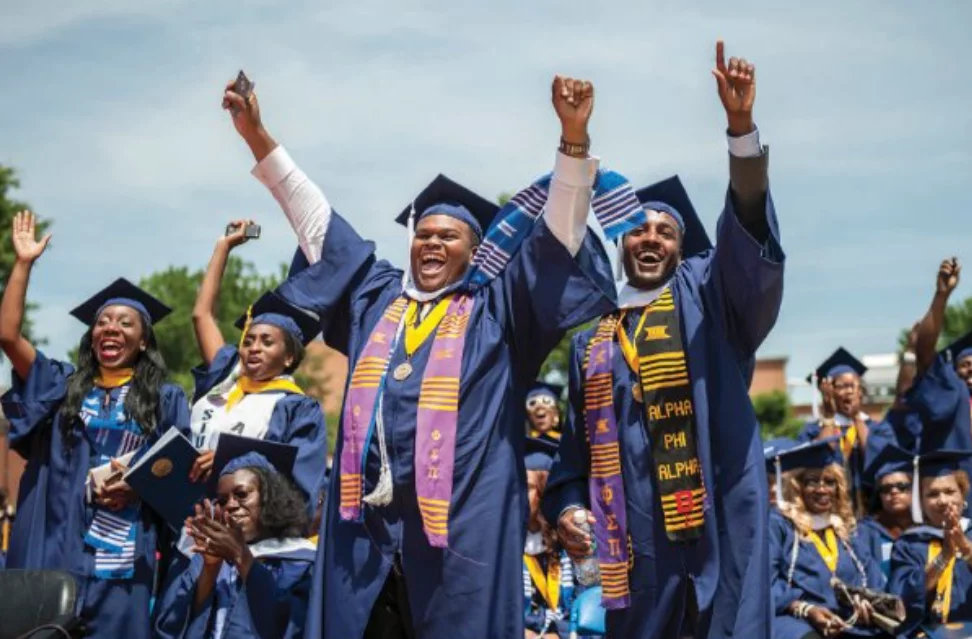Now more than ever, a record number of HBCU graduates are thriving in positions of leadership and authority. HBCU graduates are leaders in every field and include barrier-breaking public servants, scientists, artists, lawyers, engineers, educators and business owners. Several HBCU graduates serve in senior roles in the Biden-Harris Administration including the Director of the White House Office of Public Engagement Cedric Richmond, Environmental Protection Agency Administrator Michael Regan and Vice President Kamala Harris — the first HBCU graduate ever to serve as Vice President of the United States.
Despite this record of success, disparities in resources and opportunities for HBCUs and their students persist, and the COVID-19 pandemic has highlighted continuing and new challenges for HBCUs. As commencement ceremonies are celebrated across the country, thousands of graduates are beginning to enter the workforce, search for jobs and seek ways to apply their new skillset. But thanks to a new White House initiative and the dedication of the Department of Labor, an array of opportunities has opened up to these graduates, no matter the discipline.
Agencies among the Department of Labor, such as the Women’s Bureau and the National Oceanic and Atmospheric Association (NOAA), are recruiting recent HBCU graduates to come and work for their organizations.
“A lot of our minorities who attend HBCUs aren’t aware of the opportunities to work in the federal government,” Roxanne Griffith, a regional administrator with the Women’s Bureau, told WTOP News, “Even as a young person, I thought the federal government was a far reach for me, and it’s a whole lot closer than a lot of people think.”
While many believe that a government employee needs to have an extensive political science background to work in a federal position, this is not the case. In fact, the Department of Labor is looking to hire HBCU graduates from an array of specialties and concentrations from political science and economics to business and STEM focuses, women and gender studies, and everything in between.
Government jobs are also favorable as they provide stability and flexibility that can often be difficult to find in the workplace. Federal positions are known to pay fair wages and offer paid sick and vacation times, plus they are flexible with different kinds of schedules. They also provide health and retirement benefits that are often difficult to find in the workforce.
This recruitment is part of one of the White House’s recent initiatives dedicated to advancing opportunities for those attending and affiliated with a Historically Black College or University. The initiative is working closely with the President’s Executive Office on crucial Administration priorities related to advancing educational equity, excellence and economic opportunity through HBCUs. They have partnered with HBCU leaders, representatives, students and alumni.
The Department of Labor’s newest recruitment strategy is also in compliance with the initiative’s three areas of primary focus:
· Programs are embedded, ongoing and longer-term activities singularly owned by the initiative that are generally singularly delivered by the initiative but can be collaboratively delivered with others.
· Projects are finite-duration, discretionary actions, often outside the initiative’s, federal agencies’ or private sector actors’ day-to-day organizational activities; they are designed to accelerate the desired performance in a targeted area. These short-term efforts are generally jointly owned and delivered by the initiative with others and act as boosters to accelerate HBCU competitiveness.
· Policies are influential actors’ written or oral expressions of important public objectives and priorities. These actors can be public sector (e.g., local, state and federal executive/ legislative/agency) or private sector (e.g., industry/philanthropy/education/advocacy).
In adhering to these initiatives, HBCUs hope to provide more opportunities for success for their students and advocation for diversity in every workplace.
To learn more about educational opportunities for HBCU students and graduates, visit sites.ed.gov/whhbcu.
Sources: Department of Education, WTOP News, The White House, Partnership for Public Service (Go Government)



